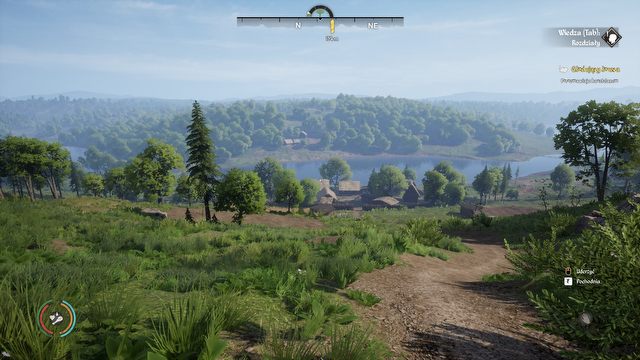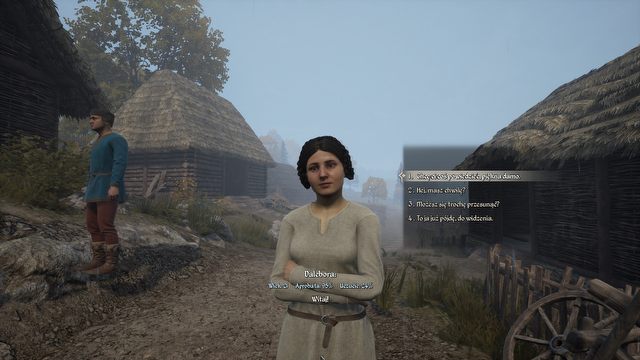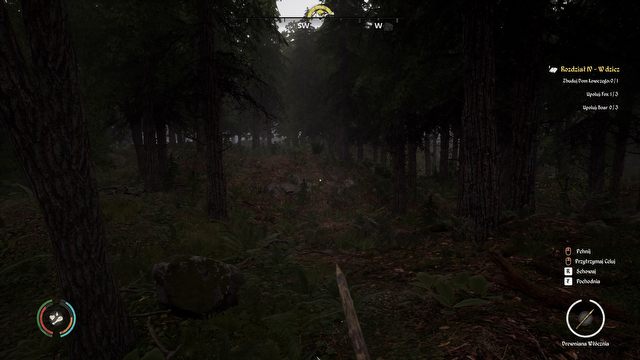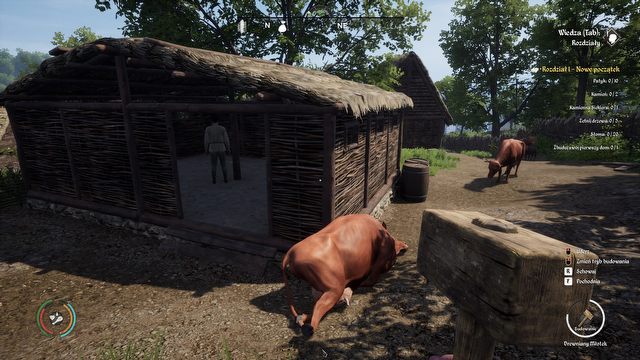Medieval Dynasty is the Hot New Hardcore Survival Sim
Exploring medieval Europe in Kingdom Come, fishing in Animal Crossing, building, and managing people in strategy games? Medieval Dynasty has it all, and then some.
EARLY ACCESS
If you don't like paying for access to beta versions, or you think that opinions based on these versions are hardly impartial, be warned: this preview is based on early access version.
Render Cube is a Polish studio that has experienced a very strange artistic arch in its short gamedev career. They went from a Halloween, cartoonish racer called Monster League to Medieval Dynasty – a... naturalistic simulator of medieval peasant life? This rather odd move was probably the idea of Toplitz Productions, the publisher. When we add them into the equation, it all starts to make a lot more sense: the German company has games like Farmer's Dynasty and Lumberjack's Dynasty in their back catalog. Not only is the latter part of their titles indicative, but these games are about the daily life of, get it, farmers and lumberjacks.
Render Cube's game appears to be a complete product (though it’s only the first days of its early access on Steam). We can both cultivate and cut down maples and pines, as well as work in the fields. At the same time, however, you can’t forget about eating, drinking, washing, gathering all kinds of fruits, establishing personal relationships, finding a spouse, having children, and, when the time comes for us and we die by accident after a brutal attack by a boar in the forest nearby (a la Robert Baratheon), leaving them some inheritance – hopefully, a large settlement. Because, my fellow gamers, it looks and it walks like the Middle Ages, and I had the painful pleasure of testing it for a year (which translates to about 10 hours of perilous wandering around the world).
YES, THIS GAME HAS A STORY
Although I'm going to discuss the missions in the game to some extent, the storyline isn’t developed enough as of yet. It doesn't mean it's not there: this paragraph, however, serves as an exposure and introduction to the gameplay proper. In the game, we play an eighteen-year-old hero, who arrives in the valley in search of his uncle. The idea is the uncle will give him work and a taste of adult life. It turns out, however, that the uncle’s already six feet under, although he did manage to make quite a reputation in the area. This gives us a little bit of credit from the locals, who are going to help us achieve our new life goal – finding employment, establishing a village and writing our own story in these bleak, monotonous and unforgiving times.
A jumble of genres
As strange as it may seem, comparisons to Kingdom Come: Deliverance, Animal Crossing, or economy strategies aren't out of place. Render Cube set out a very, very ambitious plan and created a game within the framework of Toplitz Productions' previous games, while pushing realism further. The adventure is seasoned with survival elements and a lot depends on the life achievements of the main character. These, in turn, are measured by the number of tasks completed and connections made – an RPG, through and through.
However, this is not The Forest, where you'd survive a plane crash, become stranded in the heart of the jungle and have to cope without any idea how to. Already at the start, you become overwhelmed by the number of activities you can engage in; it sometimes seems like it's too much. Rest assured, however: every interface point or skill tab, as well as the most basic mechanics and issues are explained in detail: from the simplest things such as the health bar, hunger and thirst indicators, to all the buildings and crafting capabilities.
But this might as well be counterproductive: at first, I felt like I had the honor of interacting with a work that transcended my intelligence, where the range of possibilities outweigh the number of my brain cells. The salvation came from disabling the tutorial and firing up the task log. It directed me to a particular point on the map, and the rest was history. Rappers would call it “flow.”
Running errands, like in any RPG
It's a rather subjective issue, but I don't really mind being held by the hand – or at least by the little finger. Therefore, I accepted with a lot of enthusiasm the fact that from the very start, the game told me exactly where to go (truth be told, it rather suggests it – "do what you want"). And so I would head to the indicated settlement, getting acquainted with some European forests on the way. Fans of The Witcher won't be disappointed – the folklore is abundant, and there's even a chance you'll encounter a wisent.
In any case, I cross the boundaries of the wooden palisade and headed to whoever was in charge of that fine settlement, to read a few lines of dialogue (not voiced yet). I think to myself "Darn, I think it really is an RPG." I'm given a side quest to inform the residents on the other side of the river of the impending wolf attack. They take the message with relative composure and ask me to help them build the walls – I am to bring them 40 wooden logs. By then, I was certain it was just as brazen an RPG as all those Gothics and Dragon Ages. Come on, Stranger. Do this, do that, and I promise you, you'll get some hot soup.
I must admit, though, that doing this kind of mission feels much better when you don't collect these logs with a single click, but rather have to make yourself a decent axe from the sticks and stones found along the way. And then cut down those trees by hand. And then carry the logs in a few turns, otherwise you'll break the poor man's back. While in the trance of this paradoxically engaging monotony of slamming an axe into a birch tree, I came to the conclusion that it wasn't just an RPG, but rather a genuine survival.
As the name suggests, "role-playing games" are, in a very simplified sense, about playing roles. Therefore, the relationships we enter into with other characters should carry some emotional charge. The case of Medieval Dynasty proves that a romanticized protagonist is not mandatory for having fun. The conversations with NPCs are governed by pure pragmatism. The degree of the so-called approval or affection (i.e. a character's attitude towards us) is measured in percentage points, and its ultimate purpose isn't taking the hypothetical Unigost or Dobromir towards the setting sun to save the world from a herd of boars. No. In this game, you make friends in order to convince people to live in your settlement and work for you. The same is true of love relationships, which seem to follow the worst medieval standards. You only marry for a potential heir. You're seducing to strengthen your social standing.
WATCH OUT, RPG FELLERS
You love Kingdom Come and would like to throw yourself into Medieval Dynasty just to fill the void left after completing the game from Warhorse Studios? For some, it might be a great idea – it's a similar vibe; days and nights in a slightly primitive Europe from centuries ago. Some of you may be disappointed, however, because the game doesn't emphasize combat as much, and playing, apart from patience, requires certain automation and repeating many actions, often not very sexy, also in mechanical terms. It's a little more rigid and demanding than you might think.
Collect, hunt, survive – the survival element
Just a moment ago, I mentioned the cursed cutting down of many trees. So it's time for a little anecdote. After 36 donated logs out of the required 40, my makeshift axe broke. I wanted to fix it quickly, using a very intuitive creation panel conveniently bound to one of the buttons. However, it turned out I was missing one of the most basic raw materials – stone. Specifically, two shards of stone. I had quite a lot of sticks because you can find them everywhere, whereas stones are for some reason a luxury material. I spent 20 minutes searching for them, until I discovered that the ground beneath my feet made a distinctive sound when I stepped on one of them. A real school of survival.
And while this material ought to abundant, I understand that the life of the average peasant doesn't need to be full of wonderful finds. That's why I'm able to understand that when I go hunting and the game tells me to kill three foxes, it can take an hour to find them and then some to hit them with my blunt spear. It has a certain hardcore charm, though I still think the creators need to put more work into distributing animals on the map. The forest can be dead empty for 10 minutes, just to suddenly become filled with so many mammals that you’d think the Noah's Ark wrecked somewhere in the vicinity. Mending this randomness would be worth some more effort.
Medieval Dynasty doesn't beat around the bush, and requires some really hard work and almost constant "farming." And it's not just "farming" in the sense of working on a farm, but also regular hunting, collecting mushrooms and berries to keep hunger at bay, or frequently bringing buckets full of fresh water from the stream. Each of these activities not only affects all the condition indicators, but is reflected in points of experience (welcome back to the esteemed genre of RPG).
There's a total of six different skill trees are waiting to be developed. Killing a fox will affect the hunting tree, and planting carrots will add a few points to the farming tree. Even a silly flirtation will provide some experience in diplomacy. But I'm not going to list all of these branches because, unlike the creators, I'm not a big fan of information torture. When you play or see a game in action, you can immediately feel what's going on.
ATTENTION HARDCORE PLAYERS!
An awesome thing about Medieval Dynasty is that the game features not only a day-night cycle, but also full seasonal changes. They change every 3 days (in terms of game time). In the spring, berries will be immature and eating them carries the risk of poisoning, in the summer you can eat them at will, in the autumn you have to switch to mushrooms, and in the winter, you focus mainly on hunting. In addition, the entire year doesn't go by that quickly – I had to spend more than 8 hours in the game to see the spring arrive again. Imagine starting as an 18-year-old boy, with the premise being that after his death, you will become the heir to the "throne," or rather a modest chair in the main house of the village. Oh, I have a hunch that in the future, play time will count in hundreds, maybe thousands of hours. It's just worth waiting a few months for a some more content and polish.
Build, hire, manage – life simulator with strategy elements
Once you've picked up all those stones, logs and sticks, it would be good to use them to do something more, for example to build your first house. Such a wooden habitat is just the beginning, because it will be followed by serious warehouse projects for all kinds of resources or other buildings necessary for the functioning of the village.
At the beginning, however, I thought pretty hard about how I could wrap my head around planning and implementing the entire economic and agricultural micro-system. Fortunately, having other people do the dirty work is indeed advisable, although it requires a considerable effort in building the reputation of the – admittedly ambitious – but still an eighteen-year-old. And it really takes a lot of pleading and cajoling to convince at least a single village headstrong to join you.
Potential employees can be assigned to specific jobs, but it is important to make sure there's a stock of food available. I didn't have one, and my best friend Odo quit my company after working hungry for a few hours. I'll tell you, these Middle Ages are no funny business.
Early Access with considerable potential
Medieval Dynasty has garnered moderately positive reviews so far, and it has an undeniable charm to it, although we spend most time on mundane, absolutely exhausting activities. It may not be an RPG in which exploration really pays off, nor a survival game in which you can hunt the prey you really need with realistic efficiency, but you must not forget – now get ready for the greatest cliché of them all – it's just early access. There's still a lot of work to get done.
In addition, this slightly empty map and the considerable limitations that can only be lifted with ferocious levelling up can be explained with the time period the game's set in. Because the medieval air is really hard to breathe, and you can feel the hopelessness of existence at every step. It's therefore pretty cool to be taken on a real fool's errand by the eighteen-year-old, incorrigible optimist. Kudos to the artists who are able to diversify the genre, while giving us an amalgam of genres that few studios have ever attempted. However, it would be good not to waste this, often idealized, potential and to launch a complete product in 2 or 3 years.
ABOUT THE AUTHOR
I can't stand strategy games, I rarely play survivals, but I adore role-playing. Nevertheless, I felt really comfortable in Medieval Dynasty. I was the most incompetent type of peasant you could imagine, but I felt proud when I built my little house. I was also very relieved to escape an enraged bison. I just wanted to see it up close.…





